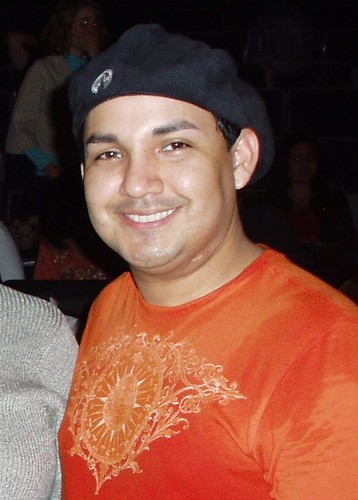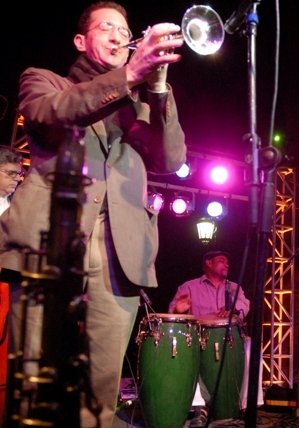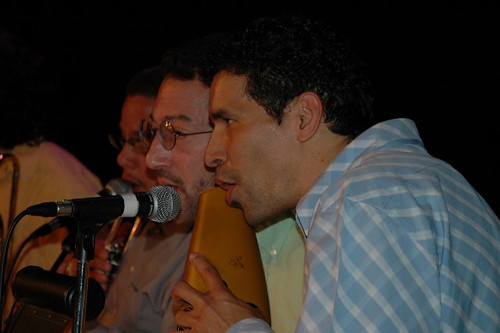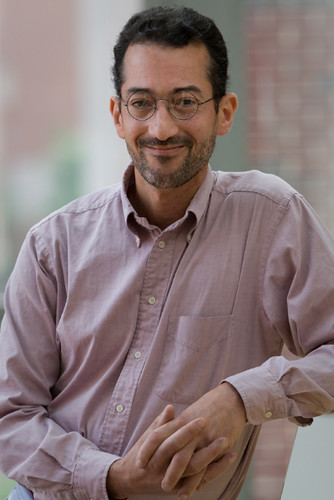 At Montas Lounge. Photo courtesy of Pilar Montas.
At Montas Lounge. Photo courtesy of Pilar Montas.It's with sadness that I report the passing of
Peter Heiman, a friend and local salsa enthusiast who remained an active part of our scene until his death last month at age 79.
I'd heard many exciting tales from
Peter's life, about his family's escape from Nazi Germany when he was a young child, and about his trips to Havana in the 1950s where he danced mambo and cha cha cha. Still, I learned a lot I didn't know about
Peter's eventful life from this obituary, written by his daughter and son-in-law,
Heidi and Robert Venier:
Peter W. Heiman obituary published in the Carrboro Citizen, July 23, 2009Though visually impaired,
Peter creatively beat social isolation. At the old
Montas Lounge, I first met
Peter on the dancefloor. He would dance with me (and all the other ladies) and at the end, request to be taken to the next dance partner.
Peter was also an avid listener to my radio show,
Azucar y Candela, Wednesdays 6-8 pm on WXDU 88.7 FM. Once he won concert tickets I was giving away, and when I personally dropped them off at his home, he wouldn't let me leave without giving me something. That turned out to be a giant chocolate bar. His kindness and joie de vivre always left a smile on one's face.
 Peter authored a cookbook in 1993. Photo courtesy of Heidi and Robert Venier.Peter
Peter authored a cookbook in 1993. Photo courtesy of Heidi and Robert Venier.Peter loved life, and he definitely loved Afro-Cuban rhythm. One of his favorite songs was "Oriente" by Henry Fiol, and whenever I played it, without fail, he would call me up at the station and we'd have a nice chat. He always ended our calls by saying, "thank you for playing such beautiful music."
Peter was a special listener; I'll miss him.
If you remember
Peter Heiman, or have stories to share at his memorial service, please join us at a celebration his life
THIS SUNDAY (8/2), 2-4 pm at the
Ronald McDonald House in Chapel Hill.
Postscript, updated 8/2:I will add some notes soon about the gathering for
Peter. In the meantime, here is a nice picture I took tonight of his daughter
Heidi and her husband
Bobby. She's a jazz singer and has worked A&R in the music business, interestingly enough. We sat around at Peter's place and talked about Celia Cruz, Tito Nieves, stickball and the Borscht Belt.
 Peter
Peter faced a lot of obstacles due to his health--among them blindness and Parkinson's. I think he threw himself at the barricades and took his disabilities as carte blanche to be as "out there" as possible, even to the point of sitting on the street with a sign around his neck at Weaver Street Market reading: "I like company. How about a 5-minute conversation?"
Peter used a red cane and and had an old man's shuffle,
until you led him to a dancefloor. He could tire out most young women, and had a firm lead. A photo of him dipping his partner, while dancing outdoors at Weaver Street, jogged memories.
Heidi confirmed for me that her parents were both inveterate dancers and took part in the New York Jewish-Latin scene, including family vacations at the famed Grossingers resort in the Catskills (where all the Latin bandleaders entertained).
Peter moved to New York from Germany at age 4, so he grew up as a real New York kid, and was reportedly a good stickball player. When
Heidi was a student at NYU, living right around the corner from the Blue Note, she and her dad went to see Tito Puente and Celia Cruz whenever they could. For me, dancing with
Peter was like a time machine, he did these slow rotational turns in a circular pattern that no one in "salsa" does nowadays; that HAD to be Cuban in origin, via the Catskills I suppose. That's stuff you can't learn in books.
He had a great talent for making friends, and giving of himself. I had no idea he volunteered for 14 years at Ronald McDonald House. Everybody had stories of his continuous thankfulness, his priceless sense of humor and pretty much shameless enjoyment of everything from music and dance to cuisine.
He made new friends right up until the end of his life, including
Gordon Strauss of Chapel Hill.
Gordon just met Peter in March 2009. Nonetheless, he summed up a lot of our comments at the service with this thought:
"Peter had something that all of us wish we had. It was intangible. It was mystical."
I think that's true--the power to see no strangers or obstacles, to find and spread joy in everything, and an absolutely audacious approach to life.
"Mystical" is a word often used by musicians and cognoscenti to describe the quality of Afro-Cuban rhythm that makes us all lifelong hostages to it. Similarly, I was reminded of the call and response of Cuban
son by the prayer of remembrance used to close the service, from the Reform Judaism Prayer Book:
At the rise of the sun and at its going down
we remember you
At the blowing of the wind and in the chill of winter
we remember you
At the opening of the buds and in the rebirth of spring
we remember you
At the blueness of the skies and in the warmth of summer
we remember you
At the rustling of leaves and in the beauty of autumn
we remember you
At the beginning of the year and when it ends
we remember you
As long as we live, they too will live, for they are now a part of us
we remember you
When we are weary and in need of strength
we remember you
When we are lost and sick at heart
we remember you
When we have decisions that are difficult to make
we remember you
When we have joy we crave to share
we remember you
When we have achievements that are based on theirs
we remember you
For as long as we live, they too will live, for they are now a part of us
we remember you
This same refrain has long been used by soneros to enshrine their musical ancestors:
"Te recordaremos."
--Ibrahim Ferrer (with Chucho Valdes), "La Musica Cubana," from the album Buenos Hermanos.
Whenever we dance, we embody the memories of the lives of those who danced before us.
Peter is part of our steps now. I hope I will dance as long and as joyfully.
 Local dance company Mambo Dinamico celebrates its 8th anniversary this weekend a visit by "Mambo King" Eddie Torres, numerous other guests who will present workshops, and live music by Charanga Carolina. This will be Torres' first appearance in North Carolina.
Local dance company Mambo Dinamico celebrates its 8th anniversary this weekend a visit by "Mambo King" Eddie Torres, numerous other guests who will present workshops, and live music by Charanga Carolina. This will be Torres' first appearance in North Carolina.












